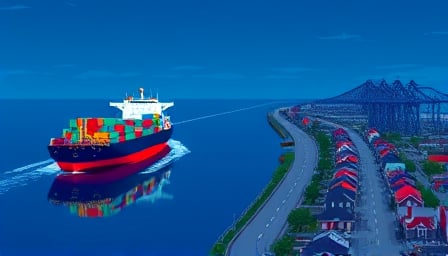A Strategic Power Play in Global Ports: Cosco’s Veto Rights Demand
In a move that underscores the geopolitical chess game unfolding in global trade, China’s largest shipping behemoth, Cosco Shipping Corp, is making waves with its audacious demand for veto rights in the acquisition of Hong Kong tycoon Li Ka-shing’s overseas ports. This development, reported by Bloomberg and echoed by Business Times, reveals the intricate dance of power, influence, and strategic interests that define today’s global economic landscape.
The Stakes Are High
At the heart of this saga are 43 ports, including two of strategic significance along the Panama Canal, currently under the ownership of Li Ka-shing’s CK Hutchison Holdings Ltd. The acquisition, a consortium effort involving heavyweights like BlackRock’s Global Infrastructure Partners and Italian billionaire Gianluigi Aponte’s Terminal Investment Ltd, is not just a business transaction but a geopolitical maneuver with far-reaching implications.
Cosco’s demand for veto rights or equivalent powers within the consortium is not merely a corporate power play. It is a calculated move to ensure that any decisions potentially detrimental to China’s interests can be blocked. This demand, while still under negotiation, highlights the lengths to which state-owned enterprises will go to safeguard national interests on the global stage.
Market Reactions and Implications
The news has sent ripples through the markets, with Cosco Shipping Holdings Co’s shares rising as much as 4.1% in Hong Kong and 2.4% in Shanghai. CK Hutchison Holdings Ltd also saw a jump of up to 3.2%, reflecting investor optimism about the deal’s progression and the strategic importance of the ports in question.
However, the ongoing negotiations and the lack of a final decision on Cosco’s role within the consortium introduce a layer of uncertainty. With a 145-day exclusive negotiation period with CK Hutchison set to lapse soon, the outcome of these talks could significantly impact the global shipping and logistics landscape.
A Test of Strategic Alliances
The unfolding drama is a testament to the complex interplay of business interests and geopolitical strategies. As Cosco seeks to secure Beijing’s blessing for the deal, the consortium faces the challenge of balancing the interests of its diverse members while accommodating Cosco’s demands.
This situation is a litmus test for the consortium’s cohesion and strategic vision. It also raises questions about the future of global trade routes and the role of state-owned enterprises in shaping the geopolitical landscape.
Looking Ahead
As the deadline for exclusive talks approaches, all eyes are on the consortium and Cosco. The decisions made in the coming weeks will not only determine the fate of Li Ka-shing’s ports but also set a precedent for future international acquisitions involving strategic assets.
In a world where economic interests and geopolitical strategies are increasingly intertwined, the outcome of this deal will be a bellwether for the future of global trade and diplomacy. The stakes are high, and the world is watching.
